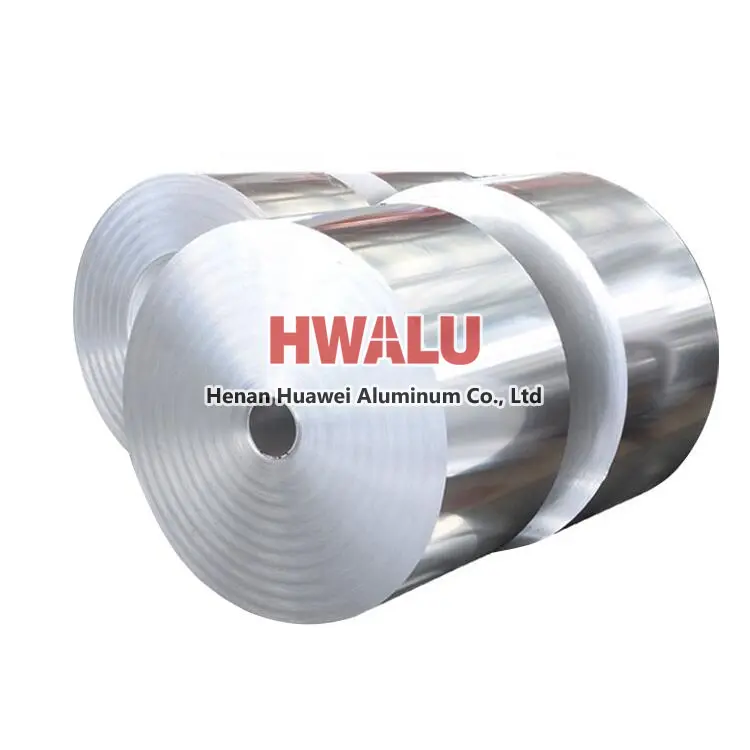What is thick aluminum foil Thick aluminum foil refers to a special type of aluminum foil that is thicker than regular aluminum foil. Usually, the thickness of the thick aluminum foil is between 0.2-0.3 mm, which is much thicker than regular aluminum foil. Like conventional aluminium foil, thick aluminum foil also has excellent properties, such as high electrical conductivity, fire prevention, corrosion resis ...
Alloy parameters of aluminum foil for cups Aluminium foil for cups is usually made of aluminium alloy materials with good processability and corrosion resistance, mainly including 8000 series and 3000 series. --3003 aluminum alloy Alloy composition Al 96.8% - 99.5%, Mn 1.0% - 1.5% Physical properties density 2.73g/cm³, thermal expansion coefficient 23.1×10^-6/K, thermal conductivity 125 W/(m K), e ...
Overview of aluminum foil for electronic products As one of the core materials of electronic devices, aluminum foil for electronic products has always been the focus of electrical appliance manufacturers. As a term that doesn't come up very often, you might have questions about it. What is aluminum foil for electronic products? What are the classifications of aluminum foil for electronic products? What are the a ...
What is a lidding foil? Lidding foil, also known as lid foil or lid, is a thin sheet of aluminum or composite material used to seal containers such as cups, jars, and trays to protect the contents inside. Lidding foils come in a variety of shapes, sizes, and designs to suit different types of containers and packaging applications. They can be printed with branding, logos, and product information to enhance a ...
What is industrial aluminum foil roll Industrial aluminum foil rolls are jumbo aluminum foil, commonly used in various industrial applications. Industrial aluminum foil is a thin, flexible sheet made of aluminum metal, produced by rolling aluminum sheets cast from molten aluminum through a series of rolling mills to reduce thickness and create uniform specifications. Industrial aluminum foil rolls are different ...
Honeycomb Aluminium foil Details Typical alloy 3003 5052 Temper O,H14, H16, H22, H24, O、H12、H14、H16、H18、H19、H22、H24、H26 Thickness (mm) 0.005-0.2 0.03-0.2 Width (mm) 20-2000 20-2000 Length (mm) Customized Treatment mill finish payment method LC/TT what is Honeycomb aluminum foil? Honeycomb aluminum foil has the advantages of light weight, high strengt ...
8011 aluminum foil is a common aluminum alloy material, which has received extensive attention and application due to its good performance and wide application fields. Below, we will introduce the characteristics and advantages of 8011 aluminum foil from various aspects. First of all, 8011 aluminum foil has excellent corrosion resistance. Aluminum foil itself has good oxidation resistance, and 8011 aluminum fo ...
In recent years, Huawei Aluminum Co., Ltd. has set up a special research team under the condition that the aluminum foil rolling mill backing roll and the inner ring of the backing roll bearing are tight, to maintain production by repairing the scrapped backing rolls, and to ensure the normal operation of the seven aluminum foil rolling mills. During the repair process, the research team was able to repair, explo ...
https://www.youtube.com/watch?v=ZR_JvbVongU The shocking statistics released by the National Center for Cardiovascular Diseases suggest that China has the highest occurrence of sudden cardiac deaths (SCD) in the world, accounting for over 544,000 deaths annually. That is to say, SCDs occur at a rate of 1,500 people/day or one person/minute in China. According to David Jin, general manager of Henan Huawei Alumi ...
Product name: 8011 aluminum foil roll ID: 76MM, MAX ROLL WEIGHT: 55kg ITEM SPECIFICATION (MM) ALLOY / TEMPER 1 0.015*120 8011 O 2 0.012*120 8011 O 3 0.015*130 8011 O 4 0.015*150 8011 O ID: 76MM, MAX ROLL WEIGHT: 100 kg 5 0.015*200 8011 O
The first step, smelting A large capacity regenerative melting furnace is used to convert the primary aluminum into aluminum liquid, and the liquid enters the casting and rolling machine through the flow groove. During the flow of the liquid aluminum, the refiner Al-Ti-B is added online to form a continuous and uniform refining effect. The graphite rotor degassing and slagging on line at 730-735°C, forming a con ...
Aluminum foil is a versatile material with a wide range of uses across various industries and households. Here are some common uses of aluminum foil: Packaging: Aluminum foil is widely used in packaging applications. It is used to wrap food items, such as sandwiches, snacks, and leftovers, to keep them fresh and protect them from moisture, light, and odors. It is also used for packaging pharmaceutical products ...








